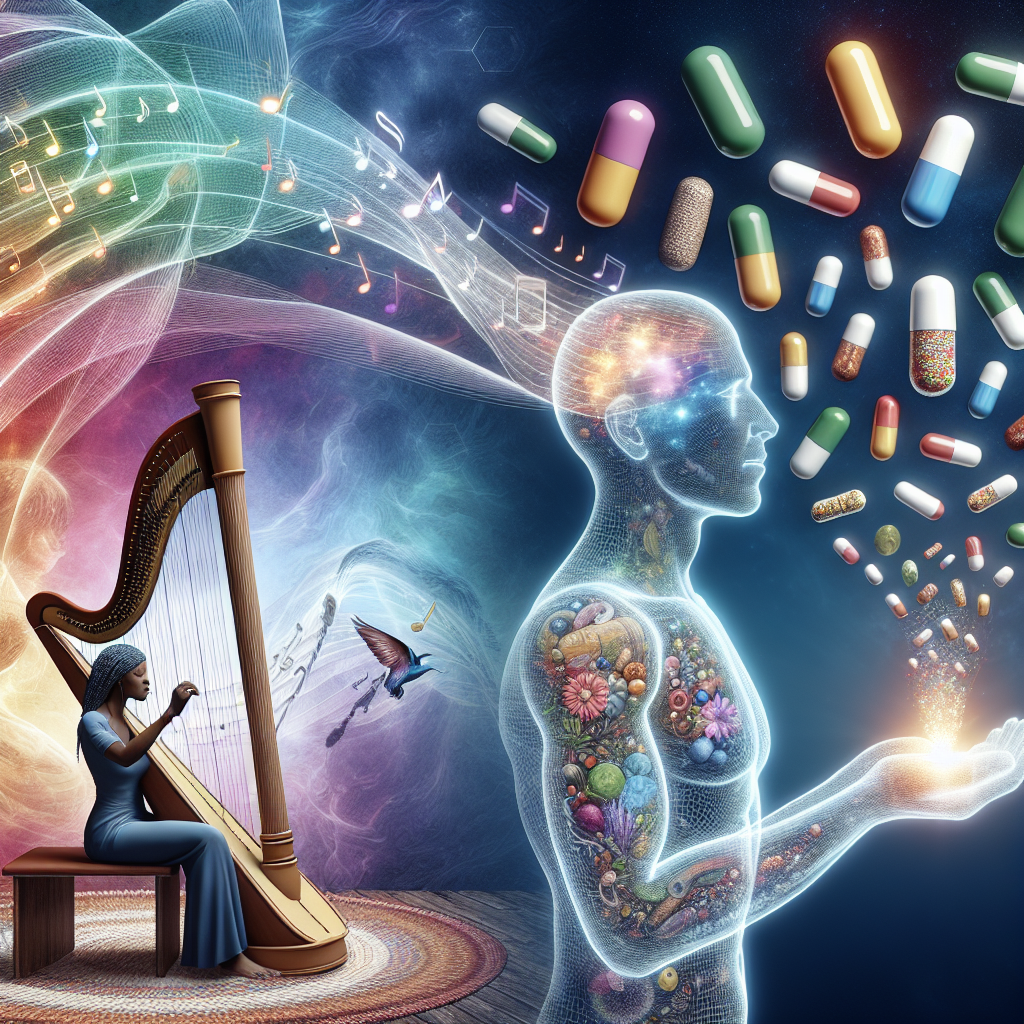How Music Therapy and Vitamins Work Together for Healing

Discover the powerful healing combination of music therapy and vitamins. Learn how these two elements work together to promote overall wellness and recovery. Visit www.myvibrantvitality.com to start your healing journey today.
Exploring the Synergistic Effects of Music Therapy and Vitamins on Healing
Music therapy and vitamins, two seemingly disparate elements, have been found to work in harmony to promote healing. This intriguing synergy has been the subject of numerous studies, revealing a fascinating interplay between the physiological and psychological aspects of health.
Music therapy, a well-established health profession, uses music to address physical, emotional, cognitive, and social needs of individuals. It involves a range of activities, from listening to music and playing musical instruments, to singing and composing songs. The therapeutic benefits of music are manifold. It can reduce stress, alleviate pain, enhance memory, improve communication, and promote physical rehabilitation.
On the other hand, vitamins are organic compounds that our bodies need in small quantities for normal growth and development. They play crucial roles in various bodily functions, including energy production, immune function, blood clotting, and maintaining healthy skin, bones, and eyes. Vitamins are also known to aid in the healing process. For instance, vitamin C is essential for the growth and repair of tissues in all parts of the body, while vitamin D helps regulate the amount of calcium and phosphate in the body, nutrients that are needed to keep bones, teeth, and muscles healthy.
The synergistic effects of music therapy and vitamins on healing are rooted in the interplay between the mind and body. Music therapy can stimulate the release of endorphins, the body’s natural ‘feel-good’ hormones, which can boost mood and promote a sense of well-being. This positive emotional state can enhance the body’s ability to absorb and utilize vitamins more effectively.
Moreover, music therapy can help reduce stress and anxiety, which are known to deplete vitamin stores in the body. By mitigating these negative emotional states, music therapy can help preserve the body’s vitamin levels, thereby supporting the healing process.
Conversely, vitamins can enhance the effectiveness of music therapy. For instance, B vitamins are essential for brain health and function. They support the brain’s production of neurotransmitters, which are chemicals that transmit signals between nerve cells. A healthy brain can respond more effectively to music therapy, leading to better therapeutic outcomes.
Furthermore, certain vitamins can enhance the body’s physiological response to music. For instance, magnesium, often referred to as the ‘relaxation mineral’, can enhance the relaxation effects of music therapy. It does this by regulating the nervous system and reducing stress levels, which can help the body relax and respond more positively to music therapy.
In conclusion, the synergistic effects of music therapy and vitamins on healing are a testament to the holistic nature of health. They underscore the importance of addressing both the physiological and psychological aspects of health in promoting healing. While more research is needed to fully understand this synergy, the existing evidence suggests that combining music therapy and vitamins can be a promising approach to enhancing health and well-being. This unique blend of science and art, of body and mind, offers a refreshing perspective on health and healing, one that celebrates the complexity and interconnectedness of the human body.
The Role of Music Therapy and Vitamin Intake in Holistic Healing

Music therapy and vitamin intake may seem like two disparate elements, but when combined, they can play a significant role in holistic healing. This unique blend of sound and nutrition has been gaining traction in the medical community, with numerous studies highlighting the potential benefits of this integrative approach to health and wellness.
Music therapy, a clinical and evidence-based use of music interventions, has been shown to help individuals improve their physical, emotional, cognitive, and social well-being. It involves a range of activities, from listening to music and playing musical instruments to singing and composing songs. The therapeutic power of music lies in its ability to tap into our emotions, stimulate our minds, and provide a sense of comfort and familiarity. It can help reduce stress, improve mood, enhance memory, and even alleviate pain.
On the other hand, vitamins are essential nutrients that our bodies need to function properly. They play a crucial role in maintaining our health and preventing diseases. Each vitamin has a specific role in the body. For instance, Vitamin C boosts the immune system, Vitamin A supports eye health, and B vitamins aid in energy production. A balanced diet typically provides all the vitamins we need. However, certain health conditions or lifestyle factors may necessitate vitamin supplements.
When music therapy and vitamin intake are combined, they can create a synergistic effect that promotes holistic healing. Music can act as a catalyst, enhancing the body’s absorption and utilization of vitamins. For example, listening to calming music while taking a vitamin supplement can help reduce stress and anxiety, which in turn can improve digestion and nutrient absorption. Moreover, the positive emotions elicited by music can stimulate the release of certain hormones that aid in the absorption of vitamins and minerals.
Conversely, adequate vitamin intake can enhance the benefits of music therapy. For instance, B vitamins, known for their role in brain health, can enhance cognitive function and mood, thereby amplifying the therapeutic effects of music. Similarly, Vitamin D, often referred to as the “sunshine vitamin,” can boost mood and energy levels, making individuals more receptive to music therapy.
The integration of music therapy and vitamin intake in a holistic healing approach is not a one-size-fits-all solution. It requires a personalized plan that considers an individual’s unique health needs, lifestyle, and preferences. A trained music therapist can guide individuals in choosing the right type of music and activities, while a nutritionist or healthcare provider can advise on the appropriate vitamin intake.
In conclusion, the combination of music therapy and vitamin intake offers a promising avenue for holistic healing. This integrative approach not only addresses physical health but also caters to emotional and mental well-being. It underscores the importance of viewing health in a broader perspective, beyond the absence of disease. As research continues to explore this fascinating intersection of sound and nutrition, it is hoped that more people will embrace this holistic approach to health and wellness.
Unveiling the Connection: Music Therapy and Vitamins in the Healing Process
Music therapy and vitamins may seem like an unlikely pair, but recent studies have unveiled a fascinating connection between the two in the healing process. This unique combination of sound and nutrition has been found to have profound effects on both physical and mental health, offering a holistic approach to healing that is both natural and non-invasive.
Music therapy, a form of expressive therapy that uses music to improve and maintain the physical, psychological, and social well-being of individuals, has been recognized for its therapeutic benefits for centuries. It involves a range of activities, from listening to music and playing a musical instrument, to singing and composing songs. The soothing power of music can stimulate the brain, reduce stress, alleviate pain, and even promote physical rehabilitation.
On the other hand, vitamins are essential nutrients that our bodies need in small amounts to work properly. They play a crucial role in maintaining good health and wellbeing, aiding in bodily functions such as metabolism, immunity, and digestion. Vitamins can be obtained from a balanced diet, but they can also be taken in the form of supplements when dietary intake is not sufficient.
The connection between music therapy and vitamins lies in their combined ability to enhance the body’s natural healing process. Music therapy can stimulate the release of endorphins, the body’s natural ‘feel-good’ hormones, which can reduce pain and promote a sense of wellbeing. This positive emotional response can boost the immune system, making it more effective in fighting off disease and promoting healing.
Similarly, vitamins, particularly antioxidants like vitamins C and E, can help to strengthen the immune system and protect the body from damage by harmful molecules called free radicals. This can speed up the healing process and help to prevent illness and disease.
Moreover, certain vitamins, such as B vitamins, are known to have a direct impact on brain function and mental health. They can help to regulate mood, reduce stress, and improve cognitive function. When combined with music therapy, which has similar effects on the brain, the result can be a powerful boost to mental health and wellbeing.
The combination of music therapy and vitamins can be particularly beneficial for individuals recovering from illness or surgery, or those dealing with chronic conditions such as depression or anxiety. The soothing effects of music can help to reduce stress and anxiety, while the nutritional boost from vitamins can help to strengthen the body and promote physical healing.
In conclusion, the connection between music therapy and vitamins in the healing process is a fascinating area of study that offers a holistic approach to health and wellbeing. By harnessing the power of both sound and nutrition, it is possible to enhance the body’s natural healing process, promote physical and mental health, and improve overall quality of life. As research in this area continues to evolve, it is likely that we will see an increasing use of this unique combination in healthcare settings, offering a natural and non-invasive approach to healing that can benefit individuals of all ages and health conditions.